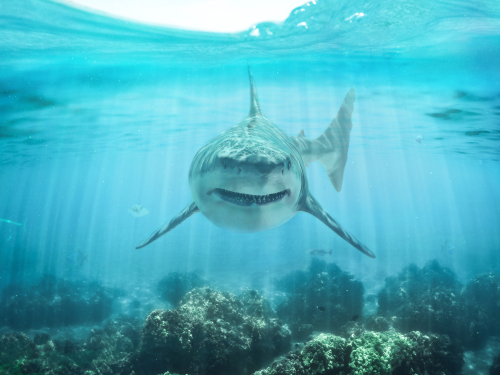Sacha Baron Cohen, known for his daring comedic stunts and characters like Borat and Brüno, recently opened up about a terrifying real-life experience—an encounter with sharks that left him hyperventilating and fearing for his life. The incident occurred during a diving expedition in French Polynesia, where Cohen found himself in the midst of a feeding frenzy after his instructor unexpectedly swam off, leaving him stranded.
The Borat star shared the story on the SmartLess podcast, explaining that what was supposed to be an exhilarating dive quickly turned dangerous. According to Cohen, the experience was intended to be a controlled environment, but when a group of sharks began circling, his instructor left him in the water, triggering panic. He described himself as having a full-blown panic attack, hyperventilating as the sharks moved closer. The thought of being left alone in such a situation clearly shook the typically fearless comedian.
Sacha Baron Cohen says he was attacked by shark—"Started hyperventilating" https://t.co/dH9CrkFUIi
— Newsweek Entertainment (@NewsweekCulture) October 18, 2024
Cohen recounted the ordeal, emphasizing how unprepared he felt. “I started hyperventilating. My breathing got out of control, and it’s really dangerous when you’re hyperventilating underwater because you start to lose oxygen quickly,” Cohen said. He credited his eventual safety to being able to regain control of his breathing just in time. Despite his reputation for pulling off audacious pranks and wild antics in front of the camera, this was a moment where he truly felt vulnerable.
The actor, who has never shied away from dangerous or risky performances, admitted that this experience was unlike any of his previous escapades. Known for playing bold and often controversial characters that put him in physical or legal danger, Cohen said the shark encounter was a stark reminder of the unpredictable dangers that exist in real life—ones that don’t offer the safety nets of his film sets.
"It becomes so crazy that you realise there's a certain amount of skill and preparation, but also you're going to be lucky. And at some point, your luck runs out."#entertainment #movies #film #actor #popculture #Hollywood
Read onhttps://t.co/Z2FQrz5R6L pic.twitter.com/ZmNejaMMtT
— IOL Lifestyle (@IOL_Lifestyle) October 18, 2024
Baron Cohen’s career has often seen him walking a tightrope between comedy and peril. Whether he’s provoking politicians in the U.S. or performing elaborate stunts in his movies, he's become accustomed to facing danger. His work on Borat Subsequent Moviefilm involved several moments where his own safety was at risk, including one scene at a gun rally where he was almost exposed, which could have led to violent retaliation from the crowd. Yet, Cohen has admitted that this shark episode shook him more than his usual on-screen escapades.
The comedian is no stranger to danger off-screen as well, having recounted other tense moments in his career. He’s previously shared stories of being chased by an angry mob during the filming of Brüno and being threatened while in character as Borat. But his diving experience shows that, sometimes, even those who thrive in risky situations can find themselves truly terrified. His quick thinking and focus on calming his breathing likely saved him from what could have been a much more tragic outcome.
The incident also highlights the broader risks associated with diving, especially in shark-infested waters. While many thrill-seekers are drawn to the allure of swimming with sharks, experts warn that even experienced divers can find themselves in life-threatening situations if they are not prepared for the sudden movements or behaviors of these ocean predators.
Baron Cohen’s recount of the episode adds another layer to his already colorful personality—a reminder that even someone as bold as him can find themselves overwhelmed by the forces of nature. It serves as a humbling moment for a man who has made a career out of pushing boundaries, both comedic and physical, and a warning to others about the dangers of underestimating the natural world.

